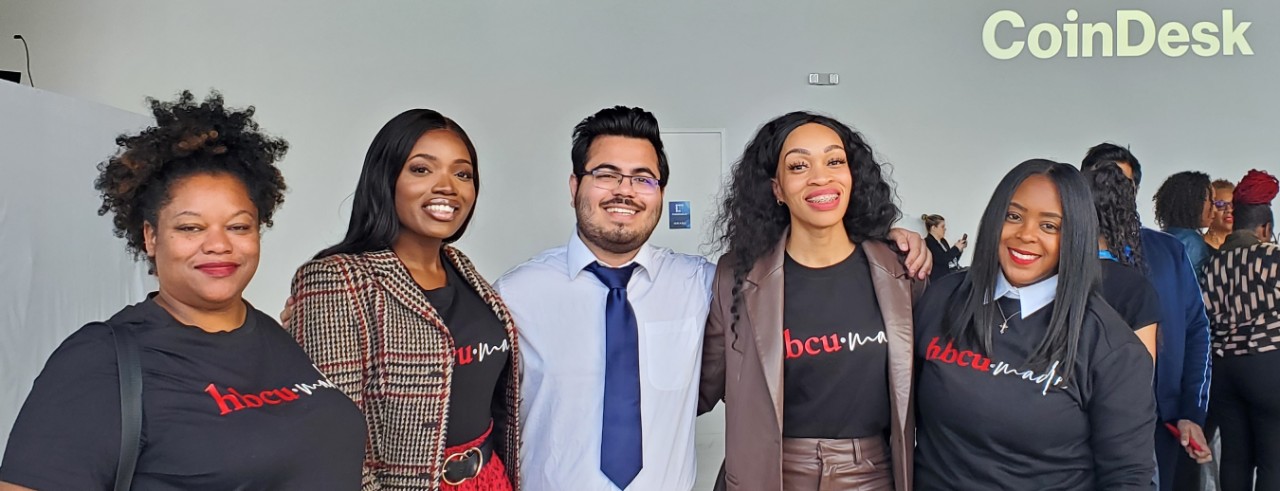
UC team wins first place in international ‘hackathon’
Student, professor develop software to counter the effects of inflation
Combining their knowledge of economics and computer science, a University of Cincinnati professor and student won first place in an international hackathon competition with their solution to counter inflation's harmful effects.
Michael Jones, PhD, the Kautz-Uible Professor of Economics at UC’s Carl H. Lindner College of Business, and Kunal Kewalramani, a senior who is studying computer science in UC’s College of Engineering and Applied Science, worked together to create a product called “realCashFlow.” Their software is a payroll component that will pay workers daily in inflation-adjusted wages with a goal of helping employers and employees better manage the effects of inflation.
“Grocery prices change every day. Wages do not,” Kewalramani said. “Paying people more regularly will give them a better idea of how much they have for the day, how much they should save and invest.”
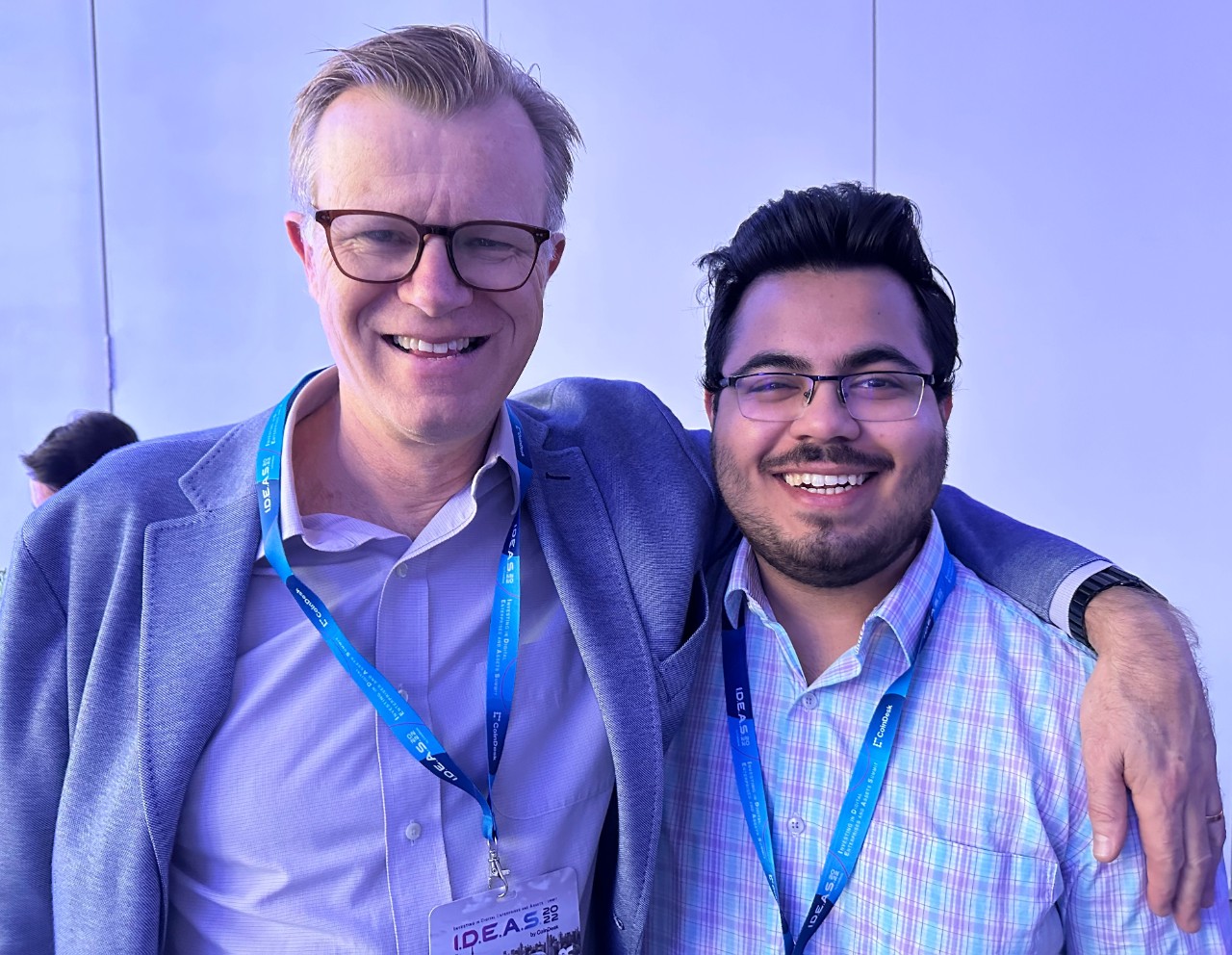
Michael Casey, left, the chief content officer of CoinDesk, and Kunal Kewalramani, a senior who is studying computer science in UC’s College of Engineering and Applied Science, pose for a photo at CoinDesk's I.D.E.A.S. Conference in New York. Photo courtesy of Kunal Kewalramani
Kewalramani and Jones competed against hundreds of entries in the Web3athon: Hyperlocal, People-First Crypto Hackathon, in which the UC team was named a standout, won first place in one of the five hackathon challenges and earned a $25,000 prize.
“We've proved the viability of the project and demonstrated market acceptance,” Jones said. “Now comes the much harder part of how do we bring this to fruition?”
The hackathon, a competition in which participants engage in engineering over a relatively short period, was sponsored by CoinDesk, a news site specializing in bitcoin and digital currencies, and the Crypto Research and Design Lab (CRADL). The two-stage competition launched in June with five challenge areas: generational wealth building, financial health, sustainable communities and culture, disaster relief and response and environmental well-being.
Of the 378 ideas submitted in stage one, 163 were selected to build a minimum viable product in stage two of the competition, including Jones and Kewalramani in the financial health category.
The UC team then was invited to CoinDesk's I.D.E.A.S. Conference in October, where it was announced as one of the 32 winners and 15 standouts who split more than $800,000 in prizes.
“We're still very much in the initial stages, but we received a lot of validation early on, which is a very good thing to know as we build out the product,” Kewalramani said. “It gives us more incentive to keep building it. I want to be in this space. I want to continue working, and I want to see it to fruition.”
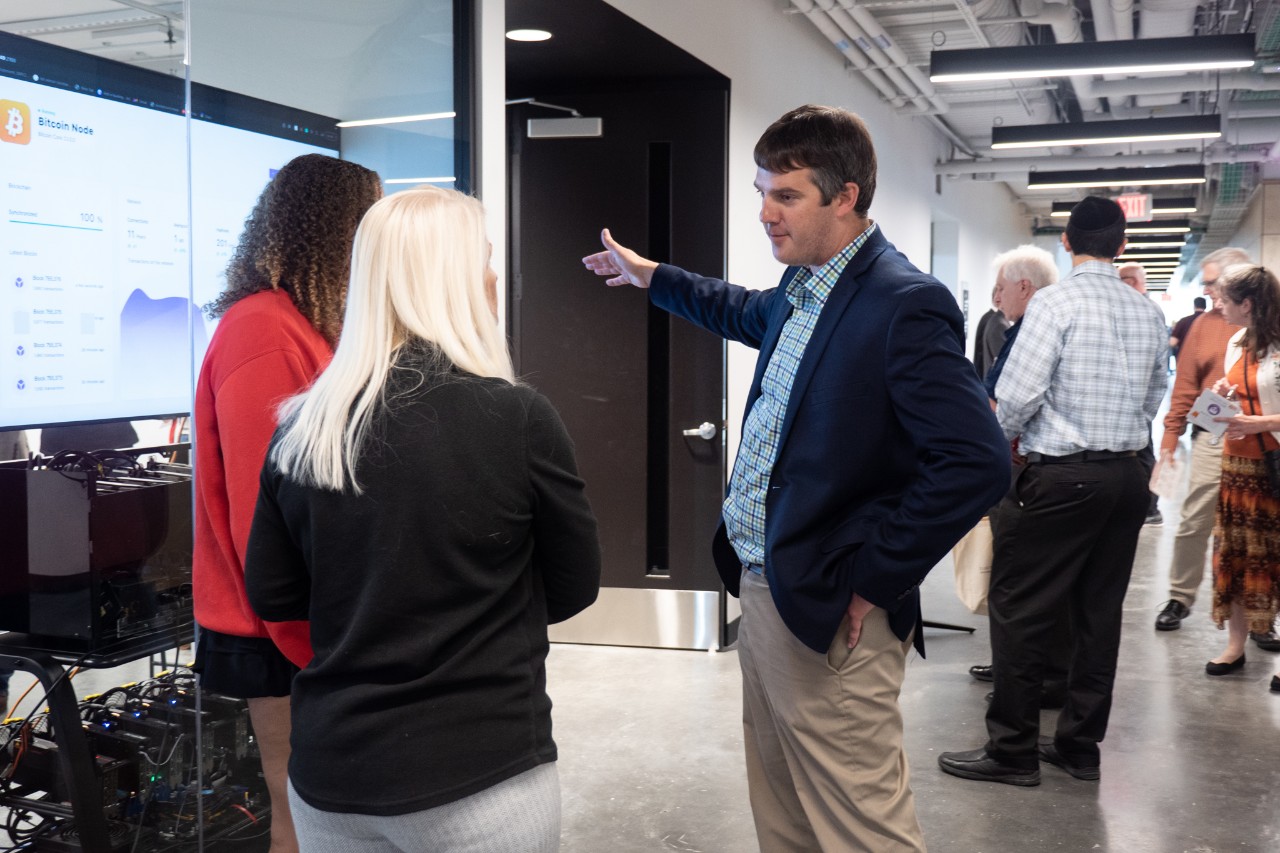
Michael Jones, PhD, the Kautz-Uible Professor of Economics at UC’s Carl H. Lindner College of Business, greets guests to the Cryptoeconomics Lab during the grand opening of UC Digital Futures. Photo/Margot Harknett
As inflation rises around the world, workers whose wages don’t increase as fast have less purchasing power. This hurts the workers, who often respond by looking for new job opportunities, hurting their current employers who deal with the effects of staff turnover.
To counter the effects of inflation, Jones and Kewalramani developed an idea to pay workers daily in inflation-adjusted wages. Using data from Truflation, a company that measures inflation in real time with adjustments for individuals’ geography and purchasing patterns, they can pay workers daily and increase wages to account for inflation.
“They get the funds from day one,” Jones said. “If you work today, why not get paid today? And when you get those wages earlier, you can invest much earlier. And when you invest earlier, you accelerate your investment returns.”
Though they’re still early in development, Jones and Kewalramani know they’ll have to solve issues such as allowing workers to transfer their funds to their local currency without exorbitant fees, or convince them to be more receptive to cryptocurrency. They will also need to navigate regulatory hurdles.
As they continue to develop realCashFlow, they expect they will need additional help from partners across UC’s campus on issues such as regulatory requirements and building a user interface.
“To actually make your idea a reality, the implementation has got to have people from all across the university,” Jones said.
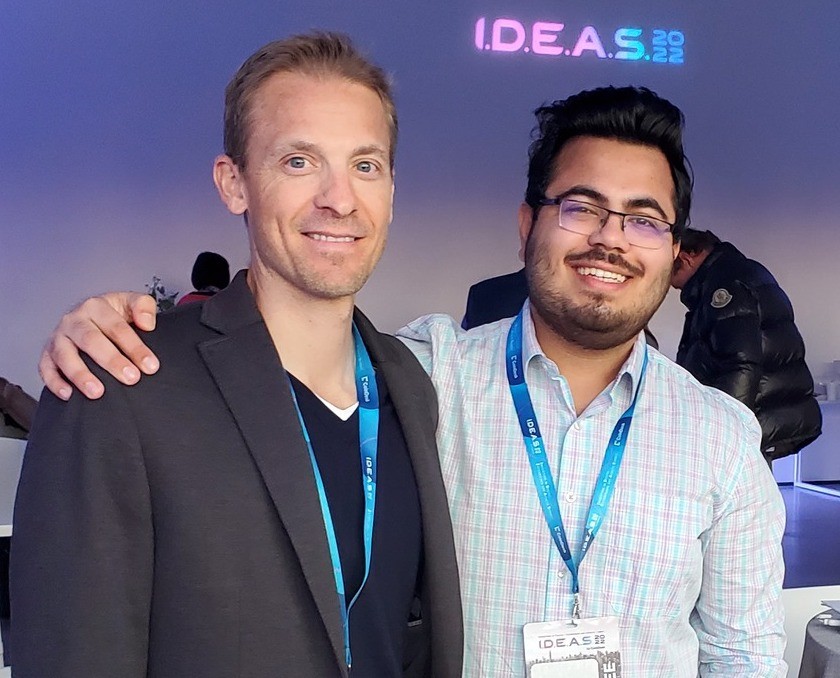
Kunal Kewalramani, right, poses for a photo with another winner at CoinDesk's I.D.E.A.S. Conference. Photo courtesy of Kunal Kewalramani
Kewalramani and Jones teamed up after meeting during the fall 2021 semester in Jones’ economics course, From Bitcoin to Blockchain.
As an honors student, Kewalramani was looking for fun classes to take when he discovered the course that explores how cryptocurrencies sparked a revolution toward a decentralized, digital economy.
In addition to teaching about cryptocurrencies, Jones also leads the Kautz-Uible Cryptoeconomics Lab at UC Digital Futures, a facility for interdisciplinary research that officially opened this fall in the Cincinnati Innovation District.
“I don't think this would have been possible two years ago,” Jones said of developing realCashFlow with Kewalramani. “Our project is validation that bringing people together in the Digital Futures building actually works.”
Kewalramani, a research assistant in the Cryptoeconomics Lab, said leaders from CoinDesk and CRADL loved the idea of the lab and expressed interest in collaborating.
“UC is taking a chance on faculty and students with awe-inspiring ideas and mind-blowing technical talent, and that is what is behind the success of the program,” UC Associate Vice President for Research Jennifer Krivickas said. “There is an abundance of extraordinary research happening in the Digital Futures building and across the University of Cincinnati, but solving problems that matter requires resources, infrastructure, faith and guidance to scale — and impactful research at scale is our objective.”
Digital Futures’ program of research was designed with meaningful and fruitful interdisciplinary collaboration and external partnerships at its core.
“I think this demonstrates Digital Futures' mission of solving problems that matter,” Jones said. “These are problems that we need solutions for in the crypto space. Inflation erodes the purchasing power of workers. Everybody is concerned with it, not just the individual workers. Companies are concerned because they don’t want to lose employees who are looking for other jobs with pay raises that can help them keep up with the cost of living. Inflation is the No. 1 problem that's facing the economy right now.”
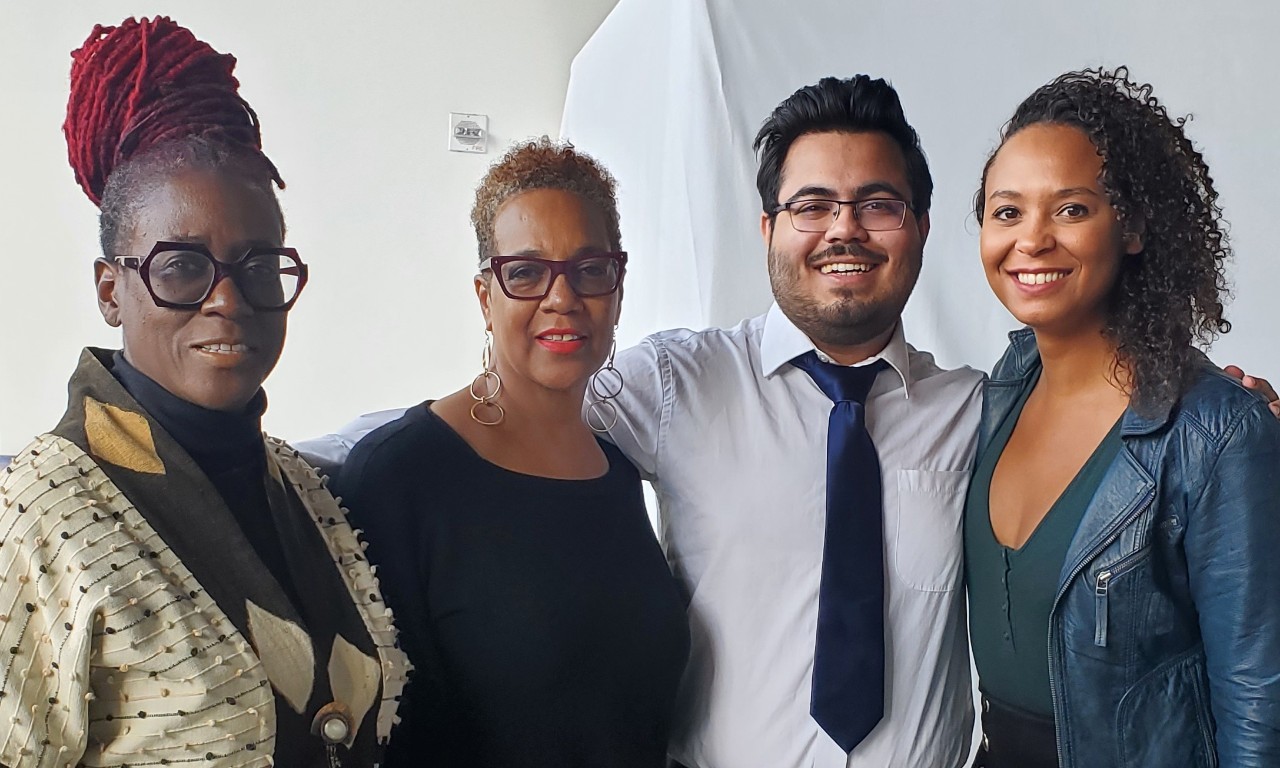
Kunal Kewalramani, center, poses for a photo with other winners at CoinDesk's I.D.E.A.S. Conference. Photo courtesy of Kunal Kewalramani
Before they teamed up, Kewalramani prepared for the work he and Jones would do by completing co-ops during his time at UC. The co-op program and the work being done in the Cincinnati Innovation District drew him to UC.
“That certainly had an impact on my decision to come here, obviously along with the co-op program,” said Kewalramani, a native of India, who has completed five co-ops. “It's really nice that UC is supporting students and faculty and giving their ideas a chance.”
Kewalraman, a UC Global Scholar, recently accepted a full-time job with a financial institution that he’ll begin after his graduation, and he plans to continue his work with Jones on realCashFlow.
“This whole project was extremely accelerated, and it still feels very fast, but it was able to come together so quickly because he had five co-ops, and he already knew how to develop his ideas,” Jones said. “It's full circle. UC is sending people out into the business world, but UC benefits from that because those skills are being brought right back into the university.”
Featured image at top: Kunal Kewalramani, center, poses for a photo with other winners at CoinDesk's I.D.E.A.S. Conference. Photo courtesy of Kunal Kewalramani
Impact Lives Here
The University of Cincinnati is leading public urban universities into a new era of innovation and impact. Our faculty, staff and students are saving lives, changing outcomes and bending the future in our city's direction. Next Lives Here.
Tags
- Impact
- College bound
- Experience-based Learning
- Student Experience
- Academic Excellence
- Office of Research
- Research
- Faculty Staff
- Economics
- International
- Cincinnati Innovation District
- Lindner College of Business
- Economics
- Economics
- Next Lives Here
- College of Engineering and Applied Science
- Science & Tech
- Computer Science
- Digital Futures
Related Stories
UC surprises, celebrates newest Bearcats on Decision Day
January 28, 2025
On Decision Day, future Bearcats learn they’ve been admitted to the University of Cincinnati. UC continues its tradition of surprising some of those students in person.
Yahoo: Future University of Cincinnati Bearcats get surprised at...
January 28, 2022
News media highlight UC's Decision Day records as students get surprised with admission and scholarships.
Incoming Bearcat hopes to follow mom into medicine
July 29, 2022
Brooke Bartholomew had a hunch something good was about to happen when she saw people carrying balloons in the University of Cincinnati’s black and red colors walk into her high school classroom.
